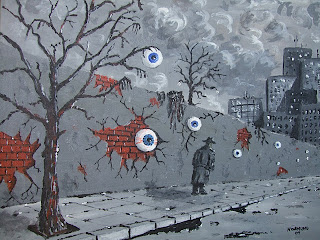The Utopians’ ideas about pleasure intrigue me. “To be sure, they believe happiness is found, not in every kind of pleasure, but only in good and honest pleasure. Virtue itself, they say, draws our nature to this kind of pleasure, as to supreme good.” (pg. 561) These lines caught my attention mainly because I was curious by what standard they determined what was “good and honest” and what wasn’t. When we’re caught up in any kind of pleasure, we’re inclined to think it’s pretty great. I find it hard to believe that Utopians could possibly be so rational all the time.
I was hard pressed to uncover their standard for “good and honest” pleasure, but at the end of the “Social Relations” section, I found this: “…For they are somewhat inclined to think that no kind of pleasure is forbidden, provided harm does not come of it.” (pg. 556) This makes sense to me, but still, sometimes we discover only in retrospect that one of our seemingly innocent pleasures has caused some unforeseen trouble. If I was a Utopian, I think I might be slightly paranoid of having fun because I might risk public scorn by accidentally do something wrong.
In spite of these qualms, I completely agree with the Utopians in their understanding of health as “the greatest of bodily pleasures.” (pg. 565) Before reading “Utopia” I always valued my health very highly, but I never thought of health as a pleasure before. More describes it this way: “The second kind of bodily pleasure they describe as nothing but the calm and harmonious state of the body, its state of health when undisturbed by any disorder.” (pg. 565)
This is such a simple concept, with which I think anyone would be inclined to agree, but our materialistic, consumerist society keeps us so busy hopping from one physical stimulus to the next that we eventually forget the foundation of all our enjoyment in this life. In our quest for tastes, sights, smells and touches we often neglect the very vessel (our bodies) which allows us to experience anything at all.
As an illustration, I reference my recent trip to New York City
I’ve been so much more appreciative of my health ever since I read this section of “Utopia”. Not only is taking our health for granted potentially dangerous to that health, but it also makes us miss out on enjoying the wonderful and perfect way our bodies work and allow us to experience the simple things in the world around us. We too often wreck ourselves on quests for bigger and better and more when we already have sources of perfect pleasure literally right under our noses and at our finger tips.





